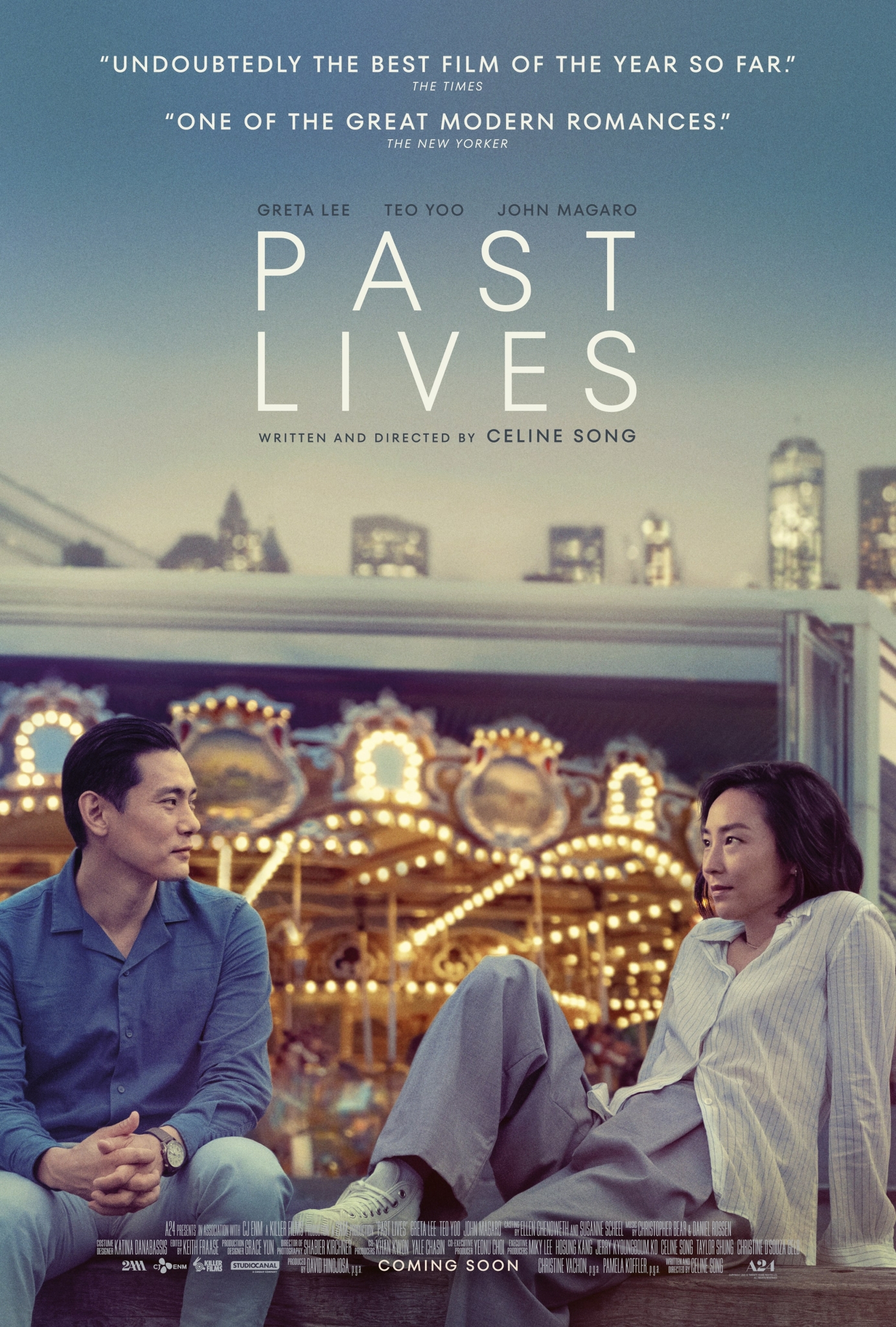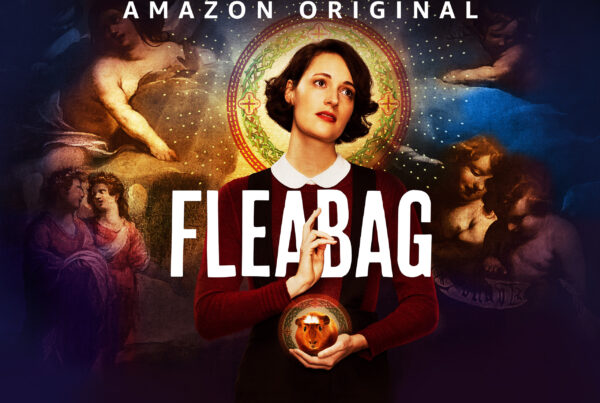

‘There is a word in Korean. In-Yun. It means “Providence”, or “fate”. But it’s specifically about relationships between people […] It’s “In-Yun” if two strangers even walk by each other in the street, and their clothes accidentally brush, because it means there must have been something between them in their past lives.’
Celine Song (director) uses the concept of ‘in-yun’ in her film as a leitmotif to explore the idea of fate. Broken down, it refers to the belief that interactions in your current life are owed to those in previous lives, playing with the idea of determinism and fateful encounters. Past Lives follows two deeply connected childhood friends from Korea – Na Young (Nora) and Hae Sung – over the span of 24 years. It documents their interactions at the points in time where their lives overlap. First at age 12 in Seoul, then at 24 – beaming at each other over Skype, and finally at 36, in New York.
The story remarkably strays aways from the typical narrative of soulmates. Instead, it subverts our expectations, sending the more realistic message that sometimes no amount of crossed fingers and pinky promises can prevent the inevitable. Things do not always turn out the way we want them to.
It’s hard to definitively nail down what this film is about, since it addresses a variety of themes such as (lost) love, identity, and fate. To me, it was most about Nora and the effects of her life choices. The audience is confronted at multiple points in time to ask the question ‘what if?’. What if Nora had stayed in Seoul? What if she’d continued talking to Hae Sung in their 20s? And while you’d think this would leave you feeling unsatisfyingly ache-y, I was left feeling wistful, but not despondent. In choosing to stay in America and pursue her career as a playwright, Nora has also chosen to leave a version of herself behind. The same version that may have ended up with Hae Sung. In some ways, it also speaks to the immigrant experience – how it can create alternative realities in the mind. In the beginning, Nora’s mum justifies their decision to leave Seoul with: “If you leave something behind, you gain something too”.
Another central theme the film deals with is that of identity. Being a native Korean that emigrated to North America, we see Nora juggle the two parts of herself. When she is around Hae Sung, she feels simultaneously less and more Korean. For individuals with multiple strings of cultural identity, this statement resonates strongly. We understand how she feels less Korean because she is confronted with all of Hae Sung’s Korean views that are not a part of her. At the same time, speaking Korean with him, and being pulled back into their familiar dynamic, reminds her of the Nora (or Na Young) that existed when they were children in Seoul. It clearly shows how a common background connects us in a unique way, and seeing the two characters standing in front of each other for the first time in 24 years grinning like kids will touch the coldest of hearts.
This disparity becomes even more evident when we experience Nora code-switching between Korean and English in conversation with Arthur, her American husband, and Hae Sung. I couldn’t help but feel uncomfortable with the underlying message of an interracial couple never quite reaching the same level of intimacy. Even so, Arthur’s attempts to learn Korean puts a realistic but positive spin on the situation. Whether it is our differences in cultural background, or other ways in which we grew up, strong relationships stand on mutual interest and effort. In this vein, I appreciated the way open communication was depicted in Nora’s marriage, and how tenderly the characters treated each other when navigating their differences.
What struck me was that I was not rooting for one individual’s success over another. None of them felt ‘bad’ to me. They just felt very human. Where we could have seen a typical testosterone-fueled struggle between two men, we see a more nuanced and authentic depiction of two very different men, who happen to love the same woman, and through this share ‘in-yun’ as well. I didn’t find myself frustrated with Nora either, whose active decisions led her to where she is. Being repeatedly reminded of the idea of fate pushed me to accept, rather than question her choices.
Ultimately, while some may brand Past Lives as another soul-crushing flick, I left the cinema (both times) feeling lighter. For me, it delicately and honestly delivered the message that there is value in acceptance and letting things go. We’ve all asked ourselves ‘what if’, when maybe we should be focusing more on ‘what is’.
Directed by: Celine Song (debut)
Past Lives is currently showing in cinemas.

‘There is a word in Korean. In-Yun. It means “Providence”, or “fate”. But it’s specifically about relationships between people […] It’s “In-Yun” if two strangers even walk by each other in the street, and their clothes accidentally brush, because it means there must have been something between them in their past lives.’
Celine Song (director) uses the concept of ‘in-yun’ in her film as a leitmotif to explore the idea of fate. Broken down, it refers to the belief that interactions in your current life are owed to those in previous lives, playing with the idea of determinism and fateful encounters. Past Lives follows two deeply connected childhood friends from Korea – Na Young (Nora) and Hae Sung – over the span of 24 years. It documents their interactions at the points in time where their lives overlap. First at age 12 in Seoul, then at 24 – beaming at each other over Skype, and finally at 36, in New York.
The story remarkably strays aways from the typical narrative of soulmates. Instead, it subverts our expectations, sending the more realistic message that sometimes no amount of crossed fingers and pinky promises can prevent the inevitable. Things do not always turn out the way we want them to.
It’s hard to definitively nail down what this film is about, since it addresses a variety of themes such as (lost) love, identity, and fate. To me, it was most about Nora and the effects of her life choices. The audience is confronted at multiple points in time to ask the question ‘what if?’. What if Nora had stayed in Seoul? What if she’d continued talking to Hae Sung in their 20s? And while you’d think this would leave you feeling unsatisfyingly ache-y, I was left feeling wistful, but not despondent. In choosing to stay in America and pursue her career as a playwright, Nora has also chosen to leave a version of herself behind. The same version that may have ended up with Hae Sung. In some ways, it also speaks to the immigrant experience – how it can create alternative realities in the mind. In the beginning, Nora’s mum justifies their decision to leave Seoul with: “If you leave something behind, you gain something too”.
Another central theme the film deals with is that of identity. Being a native Korean that emigrated to North America, we see Nora juggle the two parts of herself. When she is around Hae Sung, she feels simultaneously less and more Korean. For individuals with multiple strings of cultural identity, this statement resonates strongly. We understand how she feels less Korean because she is confronted with all of Hae Sung’s Korean views that are not a part of her. At the same time, speaking Korean with him, and being pulled back into their familiar dynamic, reminds her of the Nora (or Na Young) that existed when they were children in Seoul. It clearly shows how a common background connects us in a unique way, and seeing the two characters standing in front of each other for the first time in 24 years grinning like kids will touch the coldest of hearts.
This disparity becomes even more evident when we experience Nora code-switching between Korean and English in conversation with Arthur, her American husband, and Hae Sung. I couldn’t help but feel uncomfortable with the underlying message of an interracial couple never quite reaching the same level of intimacy. Even so, Arthur’s attempts to learn Korean puts a realistic but positive spin on the situation. Whether it is our differences in cultural background, or other ways in which we grew up, strong relationships stand on mutual interest and effort. In this vein, I appreciated the way open communication was depicted in Nora’s marriage, and how tenderly the characters treated each other when navigating their differences.
What struck me was that I was not rooting for one individual’s success over another. None of them felt ‘bad’ to me. They just felt very human. Where we could have seen a typical testosterone-fueled struggle between two men, we see a more nuanced and authentic depiction of two very different men, who happen to love the same woman, and through this share ‘in-yun’ as well. I didn’t find myself frustrated with Nora either, whose active decisions led her to where she is. Being repeatedly reminded of the idea of fate pushed me to accept, rather than question her choices.
Ultimately, while some may brand Past Lives as another soul-crushing flick, I left the cinema (both times) feeling lighter. For me, it delicately and honestly delivered the message that there is value in acceptance and letting things go. We’ve all asked ourselves ‘what if’, when maybe we should be focusing more on ‘what is’.
Directed by: Celine Song (debut)
Past Lives is currently showing in cinemas.



